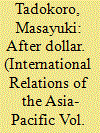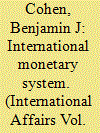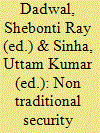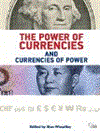|
|
|
Sort Order |
|
|
|
Items / Page
|
|
|
|
|
|
|
| Srl | Item |
| 1 |
ID:
099071


|
|
|
|
|
| Publication |
2010.
|
| Summary/Abstract |
The national currency of the United States, the dollar, plays a critical international role. The privileged position of the dollar, which has greatly facilitated America's role in world politics, is now being questioned. This article argues that the international monetary system tends to be based on hegemony rather than super-sovereignty or multiplicity, and that no serious challengers to the dollar's hegemony have yet emerged. The dollar's predominance, however, is weakening and it has turned into a 'negotiated currency'. If its international roles are to be sustained, the dollar needs to be actively supported by other major economies. 'Negotiation' may fail as rising economies, most notably China, represent American political challengers rather than subordinate allies. Should the dollar cease functioning as the reliable international currency, in the absence of an alternative hegemonic currency, the world could see a more fundamental shift, such as the wider use of private international currencies.
|
|
|
|
|
|
|
|
|
|
|
|
|
|
|
|
| 2 |
ID:
120402


|
|
|
|
|
| Publication |
2013.
|
| Summary/Abstract |
Chinese replacement of the U.S. dollar by the renminbi as the leading international currency appears unlikely, at least in the foreseeable future, owing to weakness in China's international political power and its economy, but the renminbi could develop into an Asian regional currency to some extent.
|
|
|
|
|
|
|
|
|
|
|
|
|
|
|
|
| 3 |
ID:
109508


|
|
|
| 4 |
ID:
142901


|
|
|
|
|
| Summary/Abstract |
The European Council met in London on the first of May 1998 to announce the final decisions regarding the countries that are eligible to proceed to European Monetary Union (EMU). The next day, the selected countries met in Brussels to make the decisions required to implement the decisions. The six executive directors of the European Central Bank (ECB) were appointed, including the president and vice president, and the designated countries will lock exchange rates by 1 July at the latest, and the ECU will become the euro on 1 January 1999. On this date, the process of replacing national currencies by euros within banks will begin. On 1 January 2002, the circulation of euro banknotes and coins will begin, to be completed within six months, when the legal tender status of national banknotes and coins will end.
|
|
|
|
|
|
|
|
|
|
|
|
|
|
|
|
| 5 |
ID:
081741


|
|
|
|
|
| Publication |
2008.
|
| Summary/Abstract |
This article examines the dynamics of power and rule-setting in the international monetary system. It begins with a brief discussion of the meaning of power in international monetary relations, distinguishing between two critical dimensions of monetary power: autonomy and influence. Major developments have led to a greater diffusion of power in monetary affairs, both among states and between states and societal actors. But the diffusion of power has mainly been in the dimension of autonomy, rather than influence, meaning that leadership in the system has been dispersed rather than relocated-a pattern of change in the geopolitics of finance that might be called leaierless diffusion. The pattern of leaderless diffusion, in turn, is generating greater ambiguity in prevailing governance structures. Rule-setting in monetary relations increasingly relies not on negotiations among a few powerful states but, rather, on the evolution of custom and usage among growing numbers of autonomous agents. Impacts on governance structures can be seen on two levels: the individual state and the global system. At the state level, the dispersion of power compels governments to rethink their commitment to national monetary sovereignty. At the systemic level, it compounds the difficulties of bargaining on monetary issues. More and more, formal rules are being superseded by informal norms that emerge, like common law, not from legislation or statutes but from everyday conduct and social convention.
|
|
|
|
|
|
|
|
|
|
|
|
|
|
|
|
| 6 |
ID:
139949


|
|
|
|
|
| Publication |
New Delhi, Routledge, 2015.
|
| Description |
xxxiv, 393p.Hbk
|
| Standard Number |
9781138892538
|
|
|
|
|
|
|
|
|
|
|
|
Copies: C:1/I:0,R:0,Q:0
Circulation
| Accession# | Call# | Current Location | Status | Policy | Location |
| 058272 | 355.03305/DAD 058272 | Main | On Shelf | General | |
|
|
|
|
| 7 |
ID:
126801


|
|
|
|
|
| Publication |
London, IISS, 2013.
|
| Description |
156p.Pbk
|
| Standard Number |
9781138023604
|
|
|
|
|
|
|
|
|
|
|
|
Copies: C:1/I:0,R:0,Q:0
Circulation
| Accession# | Call# | Current Location | Status | Policy | Location |
| 057556 | 332.4/WHE 057556 | Main | On Shelf | General | |
|
|
|
|
| 8 |
ID:
186220


|
|
|
|
|
| Summary/Abstract |
We explore how China's geographically targeted policies impact RMB overseas use individually or in combination. The policies include swap agreements, clearing banks, investment quotas, and direct trading between Chinese renminbi (RMB) and non-USD currencies. Adopting a fuzzy-set qualitative comparative analysis and using Bank of International Settlements cross-country data on foreign exchange markets, we find that institution building has lowered the barriers to international adoption of the RMB. Specifically, for countries economically close to China, high RMB trading is explained by either (i) having a clearing bank in the host market and direct quotations between the RMB and the local currency, or (ii) being a financial center and having access to the Chinese capital market. This combination of policies is explained by the creation of (i) “trading posts” that provide RMB liquidity abroad, and (ii) channels that allow actors to “recycle” offshore RMB funds. We triangulate our results with interviews conducted with senior People's Bank of China officials.
|
|
|
|
|
|
|
|
|
|
|
|
|
|
|
|
| 9 |
ID:
042377


|
|
|
|
|
| Publication |
Madras, Institute for finincial management and research, 1975.
|
| Description |
xii,271p.
|
|
|
|
|
|
|
|
|
|
|
|
Copies: C:1/I:0,R:0,Q:0
Circulation
| Accession# | Call# | Current Location | Status | Policy | Location |
| 022629 | 332.45/SIM 022629 | Main | On Shelf | General | |
|
|
|
|
| 10 |
ID:
097060


|
|
|
| 11 |
ID:
096248


|
|
|
|
|
| Publication |
2010.
|
| Summary/Abstract |
Although the financial and economic crisis did not directly hit the international monetary system, it has lead to the rethinking of the overall architecture that underpins the world economy. Can the current system of floating currency blocs with dollar-based trade and reserves withstand the strains of the global adjustment ahead? It is time to consider alternatives. This article argues that the existing system needs to evolve into a multicurrency one in which a number of international currencies, ideally representing the main trading areas, have the function of storing value and providing the unit of measure. A multicurrency system would respond more flexibly to the demand for liquidity and would provide a way to diversify the accumulation of reserve assets. It is also more appropriate for the increasingly multipolar world economy.
The article discusses how in today's larger and more integrated world economy the dependence on the dollar as the basis of both trade flows and financial reserves has become excessive, creating some fundamental imbalances. However, while the rationale for change is clear, the current system is locked in a form of stable disequilibrium where the status quo carries the lowest risk for most players in the short-term. Any abrupt move away from the dollar could trigger trade flow disruption and exchange value losses. Policy cooperation should keep the imbalances under control and manage the transition to a more stable system. The system will evolve, albeit gradually. Looking at the steps taken by some countries, notably China, there is the gathering impression that this decade is one of transition, rather than a 'Bretton Woods moment'. Any reshaping will have to bring in the views of the 'rising powers', China in particular, and their concerns about the limitations of the existing system and the increasingly asymmetric burden of adjustment that it imposes.
|
|
|
|
|
|
|
|
|
|
|
|
|
|
|
|
| 12 |
ID:
099070


|
|
|
|
|
| Publication |
2010.
|
| Summary/Abstract |
The 2008 financial crisis and its aftermath have triggered uncertainty about the future of the dollar as the world's reserve currency. China and other countries in the Asia-Pacific region have voiced support for a new global monetary regime. There are both economic and geopolitical motivations at the root of these challenges. Going forward, what will the future hold for the international monetary system? Crudely put, will currency follow the flag? This article addresses this question by considering the economic opportunity and geopolitical willingness of actors in the Pacific Rim to shift away from the current international monetary system - with a special emphasis on China as the most powerful actor in the region. While the dollar has shifted from being a top currency to a negotiated one, neither the opportunity nor the willingness to shift away from the dollar is particularly strong. The current window of opportunity for actors in the region to coordinate a shift in the monetary system is small and constrained. The geopolitical willingness to subordinate monetary politics to security concerns is muted.
|
|
|
|
|
|
|
|
|
|
|
|
|
|
|
|
|
|
|
|
|